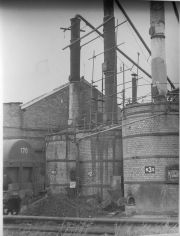British Tar Products
Producer of derivatives from the coal industry, of Sheffield; and of Cadishead Works, Hayes Road, Cadishead, near Manchester.
1916 Company incorporated[1]
1920 Company incorporated to acquire a company of similar name
1925 Converted into a public company. The company owned a tar distillation and benzol refining plant (at Cadishead) on the Manchester Ship Canal, and an ocean creosote storage facility, a fleet of lorries and tank wagons for distribution of tar. The Cadishead works, started in 1916, was bounded by the Manchester Ship Canal and by a railway embankment. There was an internal railway system worked by a Sentinel steam locomotive, and this connected with the Manchester Ship Canal Co railway system, which in turn connected with the main line at Cadishead and Irlam.
1940s many of the company's contracts with collieries came to an end when the National Coal Board decided to manufacture derivatives itself
1965 Developing interest in diversification into plasticisers; formed Febrail Ltd for extension of production of basic materials for plastics, in conjunction with Briggs and Townsend Ltd, chemical manufacturers of Cheadle, Cheshire[2]
1966 Reorganisation of the company to address poor profitability
1967 Had been running down tar products and increasing production of specialised chemicals and provision of flexible storage as a service to the chemical industry[3]
1970 Business was half chemical production and half bulk storage[4]
1971 BTP Chemicals acquired Aromatica Chemicals Ltd and Febrail Ltd[5]
1972 Acquired Cocker Chemical Co Ltd from Reckitt and Colman and the Cocker family[6]
1973 Acquired Wynmouth Lehr and Fatoils, a private dealer in edible oils[7] and William Pearson[8]
1975 Built new plant for making chlorinated intermediate chemicals
1975 Acquired Britpack, a private contract packager[9]
1979 Acquired Hodgson Tanning Products; opened new chemicals plant at Hull[10]
1985 Acquired Isinglass Manufacturers[11]. British Tar Products made an agreed bid for coatings specialist Dufay Bitumastic'[12]
1986 Name changed to BTP.
1987 Acquired chemicals company Barrow Hepburn
1988 After the purchase of Barrow Hepburn, the company reviewed its range of businesses and sold engineering and trading companies[13]
1992 Speciality chemicals manufacturer supplying adhesives, fire retardants, pharmaceutical and agrochemical ingredients, etc; rights issue[14]
2000 Clariant of Switzerland acquired BTP[15]
See Also
Sources of Information
- ↑ The Times, Apr 13, 1926
- ↑ The Times, Sep 03, 1965
- ↑ The Times, Oct 02, 1967
- ↑ The Times, Feb 02, 1970
- ↑ The Times, Aug 11, 1971
- ↑ The Times, Mar 30, 1972
- ↑ The Times, Sep 01, 1973
- ↑ The Times, Nov 01, 1973
- ↑ The Times, Jul 26, 1975
- ↑ The Times, Dec 07, 1979
- ↑ The Times (London, England), Thursday, Jun 20, 1985
- ↑ The Times, Nov 05, 1985
- ↑ The Times, June 24, 1988
- ↑ The Times, February 13, 1992
- ↑ The Times, January 25, 2000



